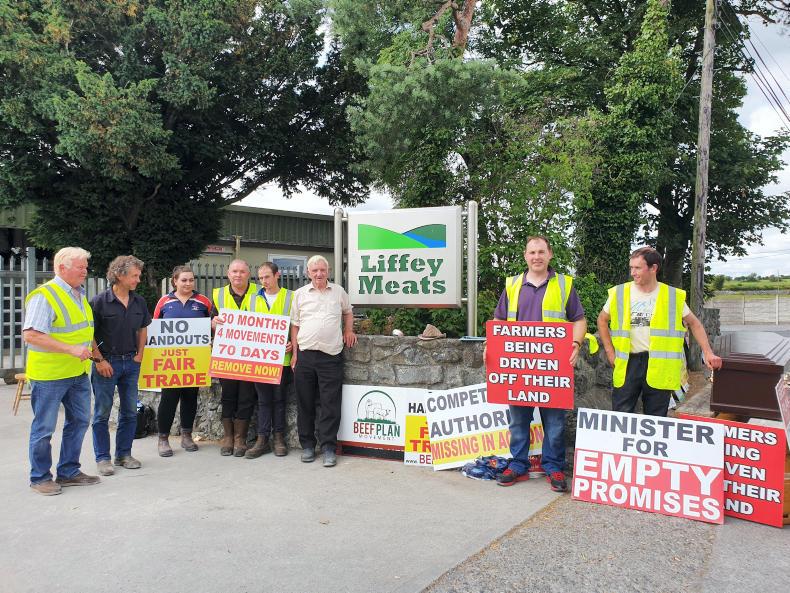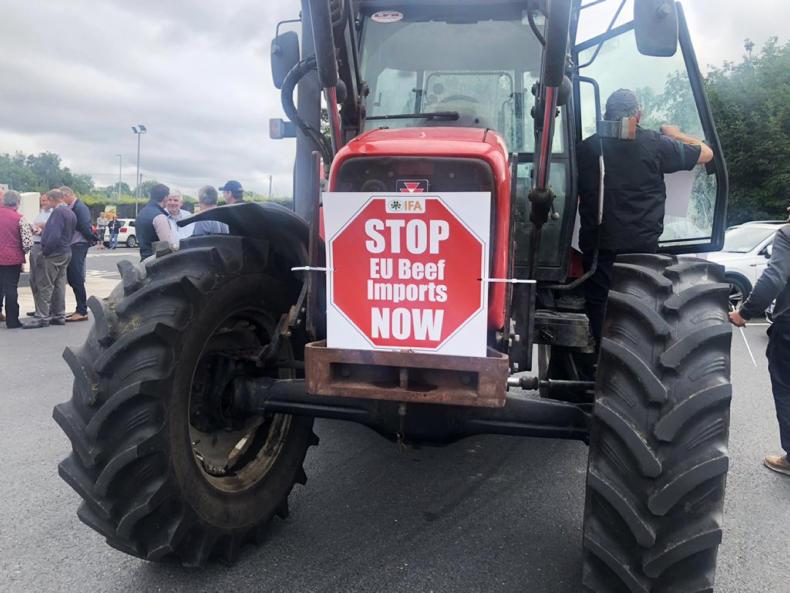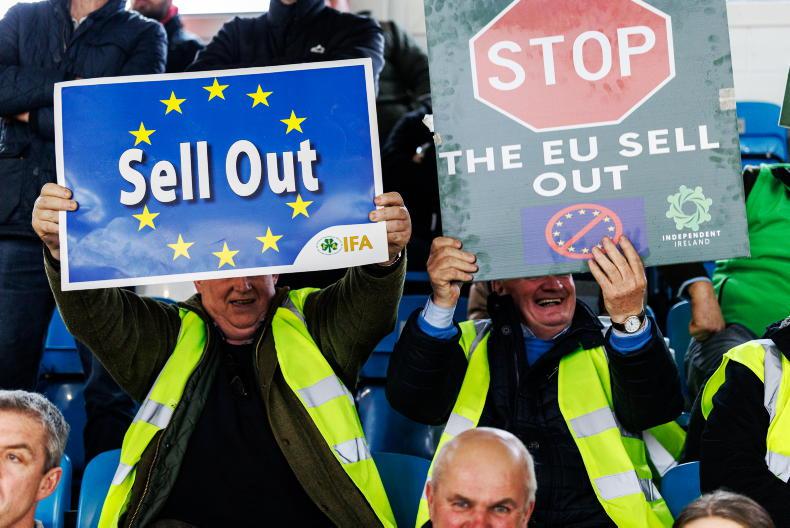Irish beef farmers are protesting about the worst beef price in five years. In fact it is so bad that in this week’s Irish Farmers Journal, the price of steers has fallen off the scale.
Frustration is getting to farmers and in the height of summer when there is a chance to get farm work done, it takes a lot to get people to give up their time to protest.
Even the factories recognise the frustration of farmers and they have a point in saying that disruption of the working day won't in itself add anything to the price of beef.
A senior factory manager recently admitted that the price paid to farmers was embarrassing but then added there was nothing they could do about it.
Trust
On the face of it, farmers and factories both have the same problem in that they cannot sell beef for the price they want to.
The problem is that farmers don’t have confidence in factories giving them the best price they can. In fact, they see it as profiteering by huge corporations that dominate the beef processing industry on the island of Ireland and Britain as well, with all the key players having expanded dramatically through acquisitions over the past decade.
That in itself needn’t be a bad thing. In fact, it puts factories in a stronger negotiating position with the huge retailers and burger chains.

Beef Plan members protest outside Liffey Meats Ballinasloe.
However, the problem is, as the editorial in this week’s Irish Farmers Journal again highlighted, the absence of any insight to the financial performance of the major beef and lamb processing groups.
This is a complete contrast to the dairy sector and while dairy farmers may not always be happy with the price of milk, they see the level of profitability achieved by the people they supply milk to.
UTP legislation
The European Commissioner for Agriculture Phil Hogan may have fallen out of favour with farmers since the Mercosur deal was announced a month ago but this is an area he has been attempting to tackle in his time in Brussels.
The final part of of this is increasing transparency in the chain beyond the farm gate and this week the Commissions independent scientific and knowledge service, the Joint Research Centre (JRC) reported.
They considered the “costs of external data reporting by private operators in the EU agri-food supply chain” based on a survey and interviews with the stakeholders involved in the chain.
The report reflected the interests of the contributors and concluded that the operational costs would be manageable but that the process could undermine product value.
This is the position that has been taken by processors, namely that if the big supermarket and burger chain buyers knew their costs and profitability that they would use it against them to squeeze price.
USA model
If supermarkets or any other buyer with huge scale was to abuse that position then that should be legislated against also. The desirability for complete transparency throughout the chain is that it would do much to build farmer confidence in factories – confidence that has been absent for a long time.
Factories need to be profitable and if they demonstrated that their profits were reasonable it would do much to build confidence and remove them as a target for protests.
There is no evidence that this information undermines beef price in the USA and they also have some of the biggest meat processors in the world
Transparency is already achieved in the USA where stocks and values of processed beef are documented and published daily by USDA.
There is no evidence that this information undermines beef price in the USA and they also have some of the biggest meat processors in the world.
If it works in the USA, there is no reason it wouldn’t work in Ireland or the EU and let us hope the Commissioner in his finals weeks with the agriculture brief manages to get it in place.
Irish beef farmers are protesting about the worst beef price in five years. In fact it is so bad that in this week’s Irish Farmers Journal, the price of steers has fallen off the scale.
Frustration is getting to farmers and in the height of summer when there is a chance to get farm work done, it takes a lot to get people to give up their time to protest.
Even the factories recognise the frustration of farmers and they have a point in saying that disruption of the working day won't in itself add anything to the price of beef.
A senior factory manager recently admitted that the price paid to farmers was embarrassing but then added there was nothing they could do about it.
Trust
On the face of it, farmers and factories both have the same problem in that they cannot sell beef for the price they want to.
The problem is that farmers don’t have confidence in factories giving them the best price they can. In fact, they see it as profiteering by huge corporations that dominate the beef processing industry on the island of Ireland and Britain as well, with all the key players having expanded dramatically through acquisitions over the past decade.
That in itself needn’t be a bad thing. In fact, it puts factories in a stronger negotiating position with the huge retailers and burger chains.

Beef Plan members protest outside Liffey Meats Ballinasloe.
However, the problem is, as the editorial in this week’s Irish Farmers Journal again highlighted, the absence of any insight to the financial performance of the major beef and lamb processing groups.
This is a complete contrast to the dairy sector and while dairy farmers may not always be happy with the price of milk, they see the level of profitability achieved by the people they supply milk to.
UTP legislation
The European Commissioner for Agriculture Phil Hogan may have fallen out of favour with farmers since the Mercosur deal was announced a month ago but this is an area he has been attempting to tackle in his time in Brussels.
The final part of of this is increasing transparency in the chain beyond the farm gate and this week the Commissions independent scientific and knowledge service, the Joint Research Centre (JRC) reported.
They considered the “costs of external data reporting by private operators in the EU agri-food supply chain” based on a survey and interviews with the stakeholders involved in the chain.
The report reflected the interests of the contributors and concluded that the operational costs would be manageable but that the process could undermine product value.
This is the position that has been taken by processors, namely that if the big supermarket and burger chain buyers knew their costs and profitability that they would use it against them to squeeze price.
USA model
If supermarkets or any other buyer with huge scale was to abuse that position then that should be legislated against also. The desirability for complete transparency throughout the chain is that it would do much to build farmer confidence in factories – confidence that has been absent for a long time.
Factories need to be profitable and if they demonstrated that their profits were reasonable it would do much to build confidence and remove them as a target for protests.
There is no evidence that this information undermines beef price in the USA and they also have some of the biggest meat processors in the world
Transparency is already achieved in the USA where stocks and values of processed beef are documented and published daily by USDA.
There is no evidence that this information undermines beef price in the USA and they also have some of the biggest meat processors in the world.
If it works in the USA, there is no reason it wouldn’t work in Ireland or the EU and let us hope the Commissioner in his finals weeks with the agriculture brief manages to get it in place.










SHARING OPTIONS